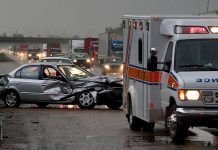Approximately 5% of people in the world have what is called amaxophobia, which is better known as the fear of driving. When you first read this statistic it might seem alarmingly high, but really it’s incredible that this percentage isn’t higher. In the United States alone there are over a million road-related fatalities, making crashes the fourth leading cause of death. Car accidents happen so often that you have an over 30% chance of being involved in a crash each time you get behind the wheel. These odds are so high because of the number of variables and the amount of unpredictability that you face on the road. There are so many things that are out of your control like inclement weather conditions or irresponsible drivers. The only thing that you can do to stay safe while driving is to follow all traffic laws, prepare yourself for tricky conditions, and know what to do in the event of an accident.
1. Weathering the Storm
Something that drivers often forget is how drastically weather can alter road and safety conditions. This is not only true in the case of snow and ice–though we will get to that–but of rain, wind, and fog as well. The reason why fog is so dangerous seems like a no-brainer. It impairs your ability to see what’s in front of you. If you’re driving through thick fog it’s important that you slow down to increase your reaction time. If the fog is bad enough and you aren’t in a hurry to be anywhere, consider pulling off somewhere and waiting for the fog to lift before you continue driving.
Heavy rain, like fog, can also greatly impair your ability to see and you should therefore take the same precautions. You should also change your windshield wipers regularly so that they are effective in keeping your windshield clear and streak-free. In addition to visibility, rain can also cause the road to be more slippery and affects the time and distance that your car needs to be able to come to a complete stop. To combat this change in stopping time, it’s important that you leave more following distance between you and the car in front of you and you start slowing down earlier before coming to a stop light.
It likely goes without saying, but the roads can also become slippery in the winter once they’re coated in ice and snow. In these conditions, it’s even more important to drive slowly and leave distance between you and other drivers. In addition to driving slowly, it is recommended that you learn how to shift your car into different gears, that way you can use a lower gear to gain more traction in heavy snow to keep your wheels from spinning. To be proactive, you should also consider putting winter tires on your car before it starts to snow regularly. Winter tires give your car a little bit of added grip and can keep you from sliding all over the roads.
3. Driving Responsibly
Most crashes are caused by driver negligence, whether that be drunk driving, distracted driving, or otherwise reckless driving. To prioritize safety, it’s important that you do not let your own driving fall into any of these categories. If go to a party and you’re too inebriated to be able to safely drive home, then ask if you can stay the night, or ask someone else for a ride home and pick your car up in the morning. Drunk driving causes nearly a third of all road-related fatalities each year, so even if you think you’re on the edge of being sober enough to drive, it’s better not to risk it.
Distracted driving, which is primarily associated with cellphone use, makes up for approximately 20% of car accidents each year. For some people, ignoring text messages while driving is easier said than done. You should have your phone within reach in case of the event you do crash, but consider putting it on ‘do not disturb,’ that way you don’t feel tempted to look at any messages until you’ve reached your destination.
3. The Aftermath of a Crash
If you do end up in an accident even after doing all that you can to prioritize safety, the first thing you need to do is contact the Joliet police to report the crash. An officer and paramedics will come to the scene to gather details on everything that happened and treat any injuries that either party might have sustained.
Your next step is to contact a car accident lawyer to help you file a personal injury lawsuit. Filing a lawsuit can help you get financial compensation for any medical bills, damaged property, or additional pain and suffering you were faced with as a result of the other party’s negligence.




